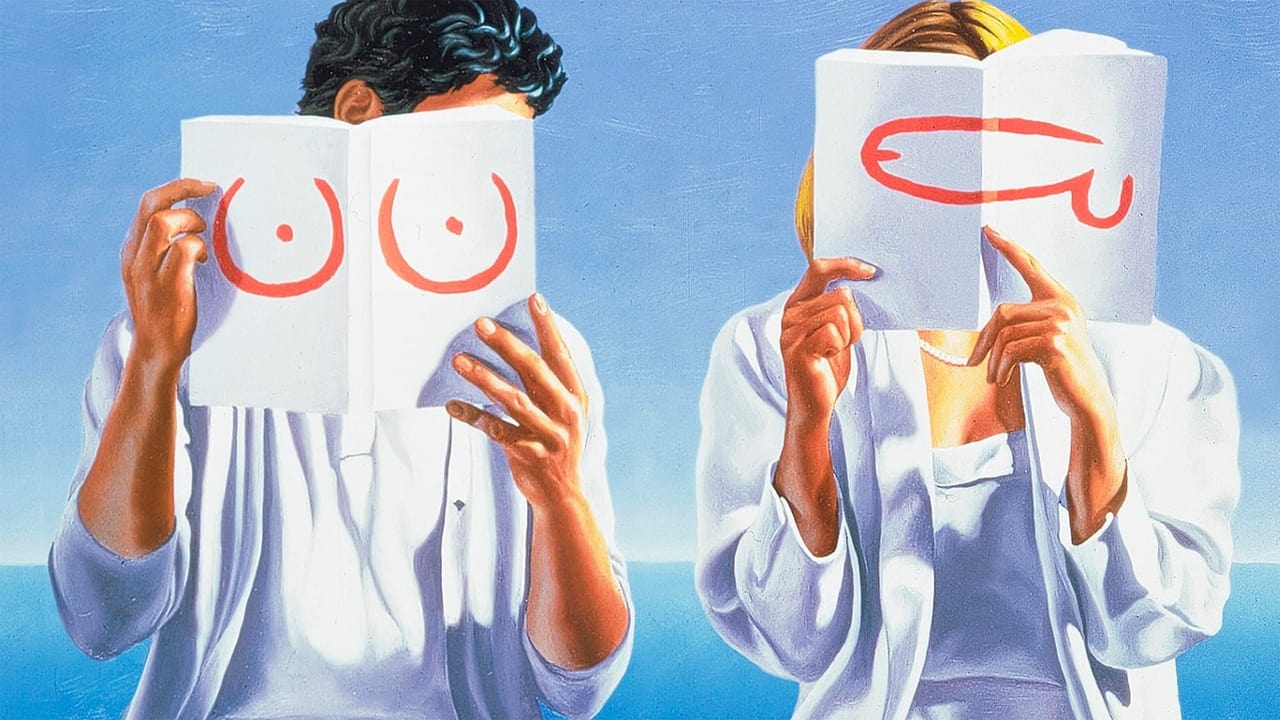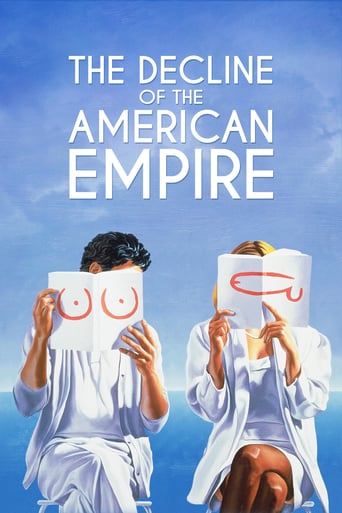Laikals
The greatest movie ever made..!
Numerootno
A story that's too fascinating to pass by...
mraculeated
The biggest problem with this movie is it’s a little better than you think it might be, which somehow makes it worse. As in, it takes itself a bit too seriously, which makes most of the movie feel kind of dull.
Frances Chung
Through painfully honest and emotional moments, the movie becomes irresistibly relatable
Mihaela Blómsdóttir
I never had a good reason to add a review to the existing ones on IMDb, but this time I was appalled by the lack of critical thinking displayed by the majority of the reviewers. This movie is *not* about sex, *not* about the sexual lives of the characters, and *not* about the battle of the sexes. As the title explicitly states, It is about the moral decline of a society, which in this particular case is made manifest through the over- indulging of the main characters on their sexual life and on their own personal gratification, at the expenses of their families, friends, and social group at large. This line of thought is made clear at the beginning of the movie. First, we see the main character – Remy – explaining the role of numbers in history, and claiming there is no place for morality in history, and thus drawing a line between personal and public history.We then see Diane – one of the main characters – interviewing Dominique – the chairperson of the History department – who has just written a book entitled "Changing Concepts of Happiness". She draws a parallel between the American society at large/Empire and the Roman Empire, arguing that the search for personal happiness is associated with the decline and fall of a society. When people are too concerned with seeking quick gratification of their appetites while ignoring their responsibilities within family and larger social group, society is doomed to collapse.And what we learn from the dialogues and the interactions that follow proves just that. What we see is that the lives of these so-called intellectuals are only marginally interested in history and the intellect. Their lives are centred around their never ending sex-hunt, and around the lies they consciously tell in order to hide the things that even according to their moral standards are considered rather unacceptable. Their relationships are fundamentally shallow and deceptive, and towards the end of the movie the whole sand castle comes crumbling down, and all is left is a huge nothingness, their nihilism, their lack of moral values and ideals. And so the story comes full circle while the characters sit together and listen to Dominique's interview, which reiterates the theme of decay, and is also the catalyst that will make the castle crumble down.The dialogues are absolutely brilliant, and it is perhaps easy to be absorbed and forget about the broader theme, and when the movie ends you are left with a sense of desolation, even desperation, the same feelings that permeate the character's lives.
Polaris_DiB
History and experience over the past couple of decades has shown us that intellectuals talking about sex is about the unsexiest and unintellectual thing anyone can do, but this wasn't quite as obvious back in 1986. Basically, the idea in this film is that these characters insatiable drive to find comfort, security, and pleasure in sexual acts is actually the unhealthy motive that makes them so unbearable to themselves--which they hide from themselves with more sex. This drive is linked to "the decline of the American Empire", as expressed in an early interview within the movie.So the idea is that relatively detestable people talk about sex, and that that talk is supposed to reveal how detestable they are as people. Arcand at least keeps giving it drive and momentum by doing interesting things with the camera such as isolating most of the characters in single frames, revealing their ultimate loneliness, and cutting rapidly between them, showing how they are more at war with each other than they are at agreement. And to give Arcand credit, this is pretty much what intellectual life is, a constant struggle with other intellectuals to stand out, even when everyone knows that standing out means standing alone.But yeah, the characters and action are unsexy and kind of pathetic. I think this film is much more an aspect of its time than it is something meant to last, which makes it kind of dated. It's also the exact type of mental buffing in dialog and references to people like Susan Sontag that makes art-house films so unpopular around the populist entertainment moviegoers. In all, I'll take it anyway--it has its place basically among the exact type of people the characters are--it's just that it's not really interesting or important to anyone who isn't those characters.--PolarisDiB
bandw
If you do not like dialog driven movies, then you will not like this, since it consists primarily of talk about sex with some general philosophizing added. With "The Decline of the American Empire" I don't know if director Arcand has served up a sweet dessert with a core of bitter almonds or a drink of Angostura bitters sweetened with a sugar cube. I lean toward the latter. I liked the leisurely pace of the opening credits which play over a long tracking shot moving down a long concourse terminating in our meeting two of the main characters - Dominique and Diane. Diane, a journalist for "Writers Today," is interviewing Dominique about her new book, "Changing Concepts of Happiness." Right up front we are introduced to the main thesis which is that a society is in decline when it becomes more concerned with individual happiness and instant gratification rather than with the general good. In such a society people resist sacrifice and marriages break down as people pursue personal happiness. What happens in the rest of the movie illustrates the point.In short order we are introduced to two more women, Louise and Danielle, who are working out in a gym. They are joined by Diane and Dominique and, during their workouts, the women discuss in intimate detail some of their past sexual exploits.Then we are introduced to four men (Remy, Pierre, Alain, Claude) who are preparing an elegant dinner for the four women we have already met. Remy, Pierre, Claude are faculty in the history department of a Quebec university and Alain is a student. Dominique is the chairman of the department, Diane is a teaching assistant there, Louise is the wife of Remy and Danielle is Pierre's partner and an undergraduate, so it's a pretty close-knit bunch of intellectuals. As the men prepare the meal they talk endlessly about their sexual exploits as well, but, as can be imagined, the tone of their conversation is a bit different from the women's. We are clearly well into the post sexual revolution era as much adultery is confessed and sexual fantasies revealed, and Claude's homosexuality is totally accepted. It is an ironic twist that the men are preparing dinner and the women are in the gym, *but* the women are in the gym so that they can be more sexually attractive to men.I asked myself why I found the men's banter more entertaining than what I have overheard many times in men's locker rooms, and the answer is that it is witty and literate rather than crude and unimaginative. Perhaps more importantly all the actors seem to be having such fun and deliver their lines with such enthusiasm that it rubs off. Also, while "The Decline of the American Empire" is no "Big Night," the dinner preparations and ultimate product are not without interest. Unless you are a gourmet cook, you will learn, as I did, about "vesiga," "velouté," "coulibiac," and "mousseline."And there are some special treats like when the four men act out a little dance about how they have to engage in that activity to please their women. While dancing they give voice to topics that they pretend interest in, for the same purpose. Their dance is clever, tightly choreographed, and hilarious.The musical score is suitably highbrow, with a little help from Handel and Francois Dompierre.So, why do I think that "The Decline of the American Empire" is ultimately depressing? Because it illustrates too well the destructive effects of the selfish pursuit of personal happiness, particularly with regard to sexual gratification. None of the relationships here is stable. And the philosophizing at the end espouses a cynical pessimism that intellectuals seem particularly good at. There is discussion to the effect that people should speak about what they know, and that's it. For example, "the Pope knows all about masturbation and prostate ailments. He can talk about that - and the CIA. Don't underestimate the Pope." The group goes on to skewer Marx, Freud, Jung, sociologists, psychologists, and even themselves. They quote Wittgenstein to justify some of their behavior: "Our only certainty is to act with our bodies." Academics, you gotta love 'em.If you go on to see the sequel, "The Barbarian Invasions" (same actors, same characters, seventeen years later) you will see that Remy's life is a metaphor for the more general thesis expounded in "The Decline of the American Empire." Each movie stands alone, but each benefits from having seen the other.
MartinHafer
I had a VERY hard time sitting through this film. Unless you really are very pro-adultery and like to hear people ENDLESSLY talking about their sexual exploits, I can't see how you could enjoy this film. Geez--most of the main characters behaved like rutting weasels and their bragging about their MANY infidelities grew tiresome. About the only element of this I appreciated was the DISGUSTING scene where the one character was urinating and blood was splattering everywhere because he'd picked up an STD---BIG SURPRISE!?! Hmm.If you want a GOOD film, watch the sequel, Barbarian Invasions. Despite the general unlikable nature of many of the characters, the sequel is VERY involving and more realistic--well worth your time.

